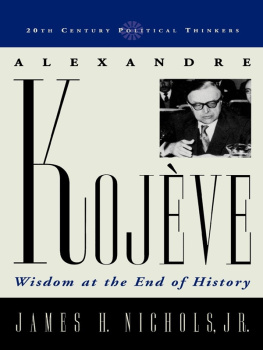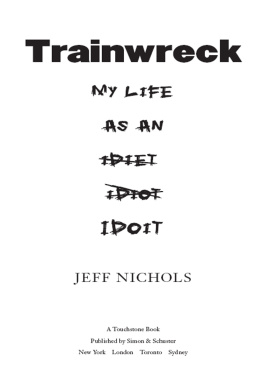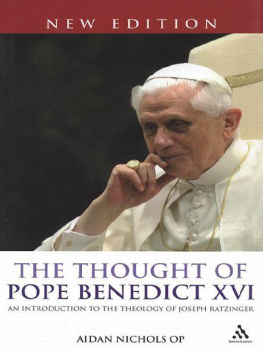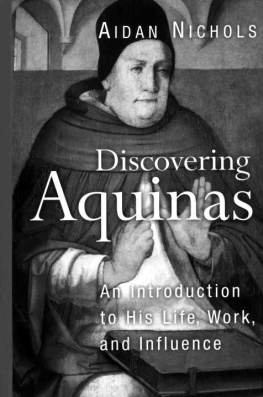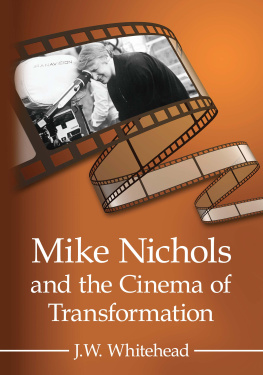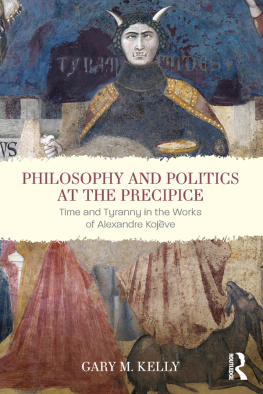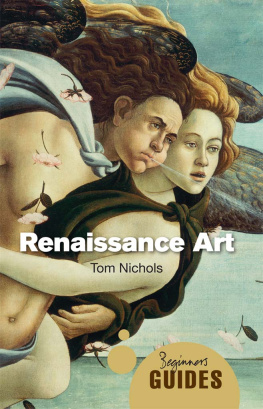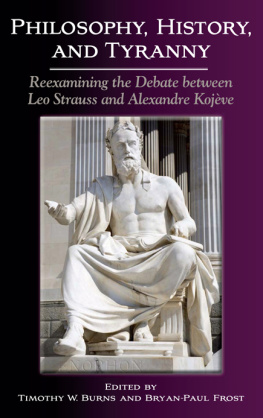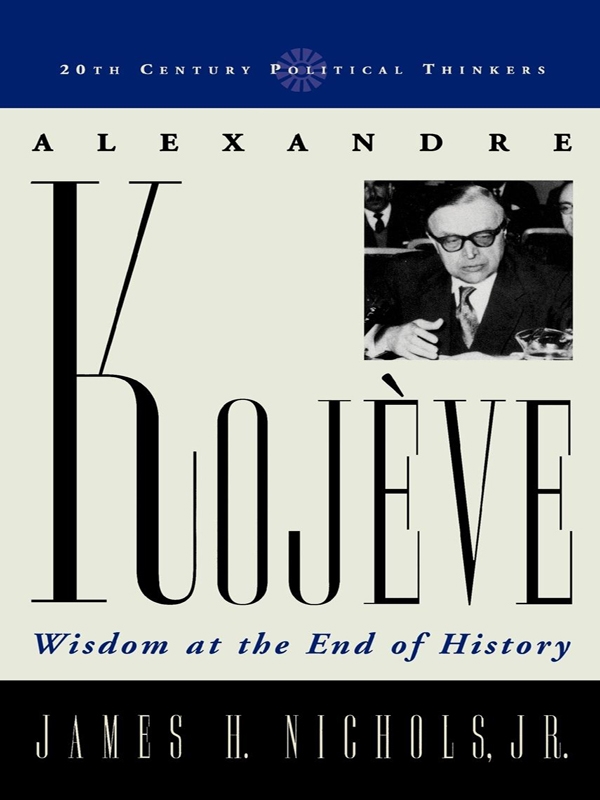Acknowledgments
I should like to express my gratitude to all those who have helped to provide the opportunity for me to write this book on the political thought of Alexandre Kojve. In doing this, I will necessarily recapitulate my own course of involvement with his work.
Moving from the present backward, I wish to thank Kenneth Deutsch and Jean Bethke Elshtain, the general editors of this series of books on twentieth-century political thinkers, for inviting me to contribute the book on Alexandre Kojve. I wish also to thank Claremont McKenna College for two sabbaticals that made it possible to devote my time to reading and writing about Kojve, and to thank the Gould Center for Humanistic Studies at Claremont McKenna College for a summer fellowship grant in 1999 that provided me timely and helpful assistance.
My chief involvement with the work of Alexandre Kojve before this present project was my translation of his Introduction to the Reading of Hegel. Allan Bloom, with whom I studied during my freshman year of college at Yale and then later in graduate school at Cornell, had kindled in me a fascination with the issues of political philosophy. It was thanks to his persuasive mentoring that, in my sophomore year, I began my study of ancient Greek and resumed Latin. At some time during that year, Irving Kristol, then publisher of Basic Books, proposed to Bloom that he prepare a translation of Kojves Introduction la Lecture de Hegel. Bloom, eager to continue uninterruptedly his work on a translation of Platos Republic, told Kristol that he could recommend someone to do it: a student of political philosophy whose French was fluent and who had successfully translated, the summer before, Kojves article The Emperor Julian and His Art of Writing. Kristol was willing to accept that suggestion, contingent upon Blooms taking responsibility for the project as editor.
So it came to pass that I spent the summer of 1964 in Paris, beginning to work on the translation of Kojves book (or more precisely, about half of the book, in accordance with the publishers decision, with the selections to be made by the editor). Now, I mention all this not only to express my indebtedness to Allan Blooms confidence in me and my gratitude to Irving Kristols decision to publish a translation of Kojve, but also to have an excuse to mention the lunch that I had with Alexandre Kojve. It was arranged by Allan Bloom, who at Leo Strausss suggestion had gotten to know Kojve rather well and had studied some writings of Hegel under his guidance. The reader can well imagine that an undergraduate, halfway toward his B.A., was rather too lacking in knowledge to pose the crucial probing questions that he might now wish that he had asked. Certainly Bloom and Kojve did almost all of the talking at the lunch in question. I remember asking him whether he thought Geist was better translated as mind or spirit and that he opted firmly for the latter. I remember that Bloom at one point steered the conversation to Kojves practical activities at the French Ministry of Economics and Finance, and I have a vague recollection of Kojve talking about his work as administering the end of history. I think he talked at one point about how in the ultimate universal and homogeneous state, all the worlds cultural riches would have to be made equally available to all mankind; since too vast a stream of tourists would spoil the cultural experience, for example, of visiting Pariss Cathedral of Notre Dame, he supposed that some technological solution would be achieved: probably some way of transporting Notre Dame all around the world to be viewed by whoever might wish to see it. Bloom at one point commented on how impressively serious Leo Strauss was about his work, and Kojve commented, Oui, Strauss est trs hu-main (Yes, Strauss is very human); Kojve, of course, argued that the wise man at the end of history has risen above mere humanity and become in some sense divine. The translation was eventually finished in 1968, and shortly after Bloom finished writing his Editors Introduction, we learned that Kojve had died at an international meeting in Brussels.
To my regret, I only met Kojve that one time, for I did not have the opportunity to spend time in Paris again until 19691970. During that year I was able to spend some time with people who had known Kojvechiefly Pierre Hassner, but also on a few occasions Raymond Aron. I also attended a couple of courses at the Sorbonne from which I was able to get a bit more of a sense of the character of French intellectual life at the time (in which connection I would mention in particular the late Professor Henri Birault, from whose fascinating courses on Nietzsche and on Heidegger I learned many things of great interest, some of them very helpful to my thinking about Kojve).
To take just one more step backward, I would like to express my gratitude to those who helped me learn French, for it was my fluency in French that made it possible for Bloom to propose me as translator of Kojve (and that contributed crucially to my fondness for French life and culture, something that, along with a love of political philosophy, I shared in common with Bloom). As regards learning French, the key experience for me was the first semester of my senior year of high school that I spent on the American Field Service foreign student exchange program. I am deeply grateful to that worthy program and to two French families with whom I lived in Lyon: chiefly the family of Maurice Philip and (at the start of my stay, before the Philips returned from summer vacation) the family of Dr. Jacques Bourret.
From September to January I attended school at the Externat Sainte Marie in Lyon, where I participated in the last year of high school education, which was called (if memory serves) lanne de philosophie (the year of philosophy). During that year, if one chose, as I did, the option of concentrating on philosophy (rather than on mathematics or natural sciences), one took a course in philosophy that met twelve hours per week. This course had a profound effect on me; it was my first introduction to the very notion of philosophy, and I wish to express my gratitude to le Pre Fournel whose learned, lively, and thoughtful teaching led me to begin to think in a serious manner about philosophical issues, as well as immersing me in (French) philosophical and moral vocabulary. My recollection of details of the course is hazy from the more than forty years of time that have since elapsed. But I think it kindled in me an interest in philosophy, and in some distinctively French aspects of thinking, that has remained alive ever since. During that semester, le Pre Fournel presented a course in philosophical ethics; in retrospect, I think I could sum up his position, as best I can remember it, as an updated development of the Pascalian misre de lhomme sans Dieu (the misery of man without God); by updated, I mean that he also drew deeply on arguments and insights of many later thinkers, of which I remember Nietzsche most vividly, while pointing the implications of such insights toward the Pascalian conclusion. The course kindled my interest in philosophy, gave me a sense that certain theological questions were inextricably connected to philosophy, and brought me closer than I had been before or have been since to religious experience.
After many years of inquiry into quite other matters than Kojves thought, it has been deeply rewarding to read and reread his works, most of them posthumously published. I have come away from that experience with a sense of the greatness of his intellectual gifts and accomplishments, with a regret that his largest philosophical project remained uncompleted and that he did not find time to perfect some of his texts rhetorically so as more strongly to catch the attention of more readers, and with the expectation that scholarly awareness of the importance of his contribution to the political philosophical discussion of the twentieth century is likely to grow in the future.

